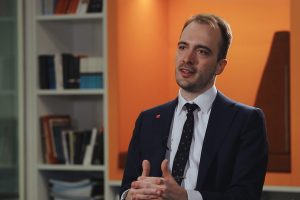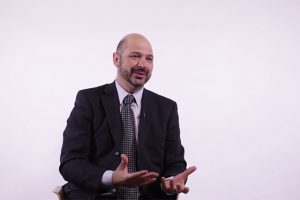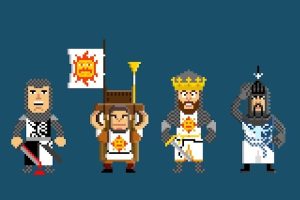Liberal Arts Education
Daniel Kontowski on the idea of liberal education, its learning outcomes and the consumerist approach to educa...
One way to think about revolutions, think about what a revolution is – it’s a project to change everything. Often we think of politics as something that happens up there – political parties involved in debates, we watch the news, we get involved, if we’re interested, we don’t get involved, people complain about apathy these days, that no one is involved enough in politics, perhaps, what’s going on in the world right now, with Trump and so on – all these kinds of questions.
If you think of revolution as a political form, one of the things that it doesn’t allow for is apathy. The reason for that is because revolution is a very peculiarly modern political form. Some people talk of revolution as the kind of myth of modernity, the birth of modernity as we know it. That’s why we always talk about 1789, the French Revolution, and somehow the beginning of the modern world. It’s a peculiarly totalizing project, it’s a project that embraces everything within its scope, it’s a project that tries politically to change everything, not just politics, but the world, in which people live, the very people that live in that world have to be transformed.
Now I work in Cuba. I’ve been working there for 20 years as an anthropologist. One of the most interesting things that I found in my research – even though originally I went there to study actually Afro-Cuban religions, I didn’t go there because Cuba had been involved in a revolutionary transformation – but what struck me most since the late 1990s when I’ve been working there is the way in which revolution is something that penetrates the whole of society and changes every nook and cranny of people’s lives. There’s no way of escaping the political forum, that is revolution, if you live in a society that has been thoroughly transformed by it as has been the case in Cuba.
One of the things that the Cuban Revolution was most famous for was its literacy campaigns in the early 60s, where young people from the urban centers were sent out to the furthest reaches of the territory to teach people how to read. One of the reasons why that was so important for Cubans, for the Cuban leadership of the Revolution, was that they saw the project of revolution as a project of the transformation of consciousness. Che Guevara talked about conciencia (in Spanish consciousness) as the target of revolutionary transformation in order to produce what he saw as the possibility of creating a new man – el hombre nuevo. The new man would be this altruistic person, a person who didn’t work for self-interest, but worked for the sake of the social whole. This involves a kind of massive project of re-education of the population right now.
One of the interesting effects of this is that Cuban people are in a sense exposed to a massive, forceful in many ways, project of transformation by the new power of the government. They feel that this kind of all-encompassing political project reaches into the very soul of the person.
In some ways you’ve got a very interesting situation in Cuba in the 1960’s and 1970’s, where you have a government that is very officially skeptical about religious phenomena. This was an atheist revolution. These were people who closed down the seminaries, we’re not interested in Catholicism, there were very suspicious of the kinds of things that I went to Cuba – to study Afro-Cuban religions, rituals – these are the religions that the slaves, who were working in the plantations in the 19th century, brought from West Africa and Central Africa to Cuba, these are very strong in Cuba today and were strong in the 1950s and 60s.
Fidel Castro and his associates wanted to eliminate this. In doing this they created a project that could be seen as an alternative religious project, because in an analogical sense this project of personal moral transformation had a very strong, almost Christian sonority to its right. Cuban people were called upon to change the way they think, the way they feel, the way they respond and to become more virtuous. Virtue is in some ways traditionally the remit of the Church, of religion. So, this is in a sense a state that takes on the role of the traditional role of the church in changing people’s conceptions of who they are, how they should act, and so on.
One priest in this religion, who is particularly prominent, who’s called Victor in Havana, who I’ve worked with a lot and other anthropologists know too because he’s so prominent. Once, when we were sitting together, drinking coffee and with a little bit of rum, he began to tell me how important he personally, as well as his colleagues in the religion of Ifá were for the sustenance of the Cuban Revolution. This was must have been in 2005 or something like that, and he was saying: “Martin, without us this revolution would have collapsed long ago, and the reason for this is that we par excellence are the experts in attracting power to the island”.
In this Afro-Cuban religion you have this concept of Ase. Ase could be translated possibly as power or as life, life principle, what gives life to things. So, I have Ase, you have Ase, an animal has Ase, a ritual might have Ase, gods have different kinds of Ase. One of the ways to attract Ase, to bring power and to charge things with power is to do animal sacrifices. By feeding the gods with the animals that they like eating and particularly with the blood of those animals you are empowering those gods. Those gods, therefore, can protect you. What Victor was saying is that because of the sacrifices of animals that he was performing and that all of these priests performed in Cuba regularly, they were feeding the island with the power of Ase. This makes the island powerful, and therefore, possible to sustain the Revolutionary project.
I find really interesting in this context a revolutionary project that asks of its people a form of asceticism, a form of self-sacrifice, a form of personal transformation that is very Christian and is self-sacrificial in many ways change yourself to become a better person, sacrifice some of your desires for the sake of the revolution. Some of the people who live within this project, these Afro-Cuban priests, who are thinking of sacrifice in a rather different way, sacrifice of animals to attract power, which by the way makes the revolution more powerful.
You’ve got these different cultural conceptions to do with sacrifice and revolution, and how these things are related, which make the Cuban Revolution today an extremely vibrant topic to be studying as an anthropologist. That in a way is a way of thinking as an anthropologist of the Cuban Revolution that thinks of it more in terms of religion, cosmology, ritual and so on, which are the kinds of things that anthropologists very often talk about.
There’s other ways to think of the Cuban Revolution as a kind of cultural phenomenon or a socio-cultural phenomenon. Here I want to tell the story of a different character, not of Victor anymore, but Clarita, who’s another person that I’ve known for a number of years in Cuba, who is a very normal lady. She’s in her mid 40s, she has worked for a very long time in a construction company, more recently she’s been working in the tourist industry. She is a person who’s in her 40s, so she was born in the process of the revolution. She was born in there in the 70’s, and she’s never known anything different, she’s always lived within this thing that the Cubans called La Revolución, this thing that captures everything inside it. She’s not very political herself, she just lives her life.
She told me once the story. I’ve met her in the morning, and she was a little bit frustrated, when we met and she said to me: “Oh, I’m so fed up, you know. I took this taxi to come here”. In Cuba you have these communal taxis where basically have six people in the same cab going in different places, it’s a bit like a taxi bus. So, you meet people in the taxi. There was this person in the taxi apparently who was complaining, and complaining, and complaining about politics, and about the government, and about all the problems, and the poverty, and the difficulties, and he wanted to travel, and he wanted to leave and go and live in Miami.
So, she just got fed up with him and listening to all his problems, and she said to him inside the taxi: “Listen man, if she’s so exhausted and so frustrated with this situation, why don’t you just leave the country? Why don’t you just make yourself a boat or find a boat and travel to Florida?”, which is what a lot of Cuban people do – they leave Cuba in the middle of the night, and go and migrate to the United States. Then she turned to me as she was telling me this story and she says:” You know what, Martin, I am a revolutionary in my own way, I am a revolutionary. Why? Because I’ve been formed in this revolution”.
That to me was a very interesting statement. What does it mean for someone who is not particularly political? She wasn’t a member of the party, she wasn’t a communist. Nevertheless, she found that it was important for her to say to me that in her own way she is a revolutionary and to explain that by saying that she has been formed by the revolution. If you go into the life story of this woman a little bit more, I think, you begin to get a better sense of what that might mean.
I mentioned earlier on the significance that people like Che Guevara attached to the revolutionary transformation of people as a project of the transformation of their consciousness through education. This idea that you will create revolutionary people, these new people, through changing the way that they think effectively, that project didn’t work at all in the case of this woman. She was quite normal in that sense. But what did work is the way, in which the revolution as a state political project penetrated her very life in a much more material way – not in the way that she thinks, but in the way that she is able to live.
Even more interesting for me is the way in which the revolution is constructed through infrastructure. In a state revolutionary society such as the Cuban – and the same could be said about the Soviet Union or about many countries in Eastern Europe, or about Mozambique, or Angola, or many socialist countries across the world – the state takes on this paternalistic responsibility of housing the population.
What’s interesting about this woman, Clarita, that is that she worked in a construction company for a great part of her life, and part of her being working in this construction company gave her the right to build her own house through state resources. This was a project that lasted for about eight or nine years right, and a very complicated process that involved Clarita in a very complex web of relationships with state officials, with state materials, with state logistics companies, who have to bring cement to the neighborhood, who had to bring bricks to the neighborhood, who have to bring the workmen. She herself with her mother had to feed these workmen. She established relationships with them, because she was feeding them.
The state project of revolution understood as a project of infrastructure became a personal project for her right and what she ended up with in this case, to cut a very long story short, was the house that she’s living in today. Every brick in that house, every bit of cement connects that woman internally with a state project of revolution. You have this intimate daily relationship between a woman and the revolutionary project, which begins to give you a sense, in which revolution is not just the political thing that people do up there, but a personal thing that feeds you, that houses, etc.
To sum up what you could say is that because precisely of its all-embracing quality the Cuban Revolution specifically – but perhaps we could say the same for revolutions in different parts of the world – manages to penetrate very deeply into people’s lives in a way that other political forms perhaps don’t always manage to do. It doesn’t respect these distinctions between the private and the public. It becomes a very personal project. That is very interesting, because on the one hand you can see the revolution as a project of penetrating into people’s lives, but in a kind of reciprocal movement – you can see the ways in which the way that people live their lives transform the nature of the political project, as we saw in the in the example with religion, where you saw these Afro-Cuban priests imagining themselves as transforming the nature of the project. So, it’s actually very interesting to see – if you start treating revolutionary politics as a cultural and social form – the interrelationship, the interpenetration between politics and culture, and society, and how they mutually transform each other in the deepest sense possible.

Daniel Kontowski on the idea of liberal education, its learning outcomes and the consumerist approach to educa...

Communication Scholar Grant Kien on Heidegger, Google glass, and autoethnography

Professor of French and Medieval Studies Norris Lacy on the evolution of Arthurian legend, the Grail Quest, an...